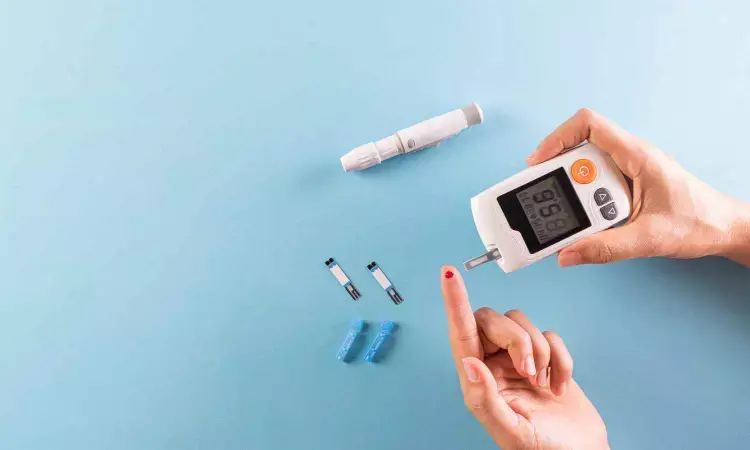- Home
- Medical news & Guidelines
- Anesthesiology
- Cardiology and CTVS
- Critical Care
- Dentistry
- Dermatology
- Diabetes and Endocrinology
- ENT
- Gastroenterology
- Medicine
- Nephrology
- Neurology
- Obstretics-Gynaecology
- Oncology
- Ophthalmology
- Orthopaedics
- Pediatrics-Neonatology
- Psychiatry
- Pulmonology
- Radiology
- Surgery
- Urology
- Laboratory Medicine
- Diet
- Nursing
- Paramedical
- Physiotherapy
- Health news
- Fact Check
- Bone Health Fact Check
- Brain Health Fact Check
- Cancer Related Fact Check
- Child Care Fact Check
- Dental and oral health fact check
- Diabetes and metabolic health fact check
- Diet and Nutrition Fact Check
- Eye and ENT Care Fact Check
- Fitness fact check
- Gut health fact check
- Heart health fact check
- Kidney health fact check
- Medical education fact check
- Men's health fact check
- Respiratory fact check
- Skin and hair care fact check
- Vaccine and Immunization fact check
- Women's health fact check
- AYUSH
- State News
- Andaman and Nicobar Islands
- Andhra Pradesh
- Arunachal Pradesh
- Assam
- Bihar
- Chandigarh
- Chattisgarh
- Dadra and Nagar Haveli
- Daman and Diu
- Delhi
- Goa
- Gujarat
- Haryana
- Himachal Pradesh
- Jammu & Kashmir
- Jharkhand
- Karnataka
- Kerala
- Ladakh
- Lakshadweep
- Madhya Pradesh
- Maharashtra
- Manipur
- Meghalaya
- Mizoram
- Nagaland
- Odisha
- Puducherry
- Punjab
- Rajasthan
- Sikkim
- Tamil Nadu
- Telangana
- Tripura
- Uttar Pradesh
- Uttrakhand
- West Bengal
- Medical Education
- Industry
Increase in platelet indices potential predictors of poor glycemic control in diabetes, suggests research

Researchers have determined the potential value of platelet indices as highly predictive tools for poor glycemic control in patients with type 2 diabetes mellitus. Diabetes is a chronic metabolic syndrome whose prevalence is ever-increasing worldwide and has a multitude of complications, among which are the activation of platelets and pro-thrombotic states. Because platelet indices like PDW and MPV indicate shifts in platelet function, they have not been applied in predicting poor glycemic status in diabetic patients. The study was recently published in the World Journal of Diabetics by Regassa and colleagues.
This was a cross-sectional comparative study between June 15 and August 12, 2022. The number of respondents was 261: 174 type 2 diabetics and 87 controls who are nondiabetic. Systematic random sampling will be employed. A structured questionnaire and checklists, besides direct physical measurements and laboratory tests will be administered. The parameters of platelets and fasting blood sugar were assessed by the measurement of blood samples by Sysmex-XN550 hematology analyzer, and CobasC311 biochemistry analyzer was used to measure the former. χ² test, Mann-Whitney U test, Kruskal-Wallis test, post hoc analysis, Spearman correlation, and receiver operating characteristic (ROC) curve analysis were carried out with the help of SPSS version 25 software. Values of P < 0.05 were considered statistically significant.
Key Findings
• The study proved that the diabetic group demonstrated significantly higher platelet indices in comparison with the control, healthy group. In particular, significant differences were found in the case of platelet distribution width (PDW), mean platelet volume (MPV), platelet large cell ratio (PLCR), and plateletcrit (PCT) counts of the diabetic group as compared to control (P < 0.001).
• The significant correlation of the platelet indices with poor glycemic control was established wherein the PDW, MPV, PLCR, and PCT levels were found to be significantly high in diabetic patients with poor glycemic control when compared with the well-controlled diabetic patients and non-diabetic volunteers.
• The study found that with a cut-off value of 15.75 fL and AUC of 0.803, PDW was a good predictor for poor glycemic control. MPV cut off was at 12.25 fL while AUC was at 0.774, PLCR cut off was at 36.3% while AUC stood at 0.775, and PCT had a cut-off of 0.24% with AUC at 0.761. All the indices were found to be good indicators of bad glucose regulation in diabetic patients.
This study reveals higher and statistically significant platelet indices in diabetic patients and unfolds the fact that such markers may predict poor glycemic control. Conclusion Routine screening of platelet indices can be a part of the follow-up and management process for the type-2 diabetic patients. Early identification of high-risk groups by simple, non-invasive tests may improve disease management and prevent complications.
Reference:
Regassa, D. A., Berihun, G. A., Habtu, B. F., Haile, W. B., Nagaash, R. S., & Kiya, G. T. (2024). Platelet indices as predictors of poor glucoregulation in type 2 diabetes mellitus adults at Bishoftu General Hospital, Ethiopia. World Journal of Diabetes, 15(9), 1889–1902. https://doi.org/10.4239/wjd.v15.i9.1889
Dr Riya Dave has completed dentistry from Gujarat University in 2022. She is a dentist and accomplished medical and scientific writer known for her commitment to bridging the gap between clinical expertise and accessible healthcare information. She has been actively involved in writing blogs related to health and wellness.
Dr Kamal Kant Kohli-MBBS, DTCD- a chest specialist with more than 30 years of practice and a flair for writing clinical articles, Dr Kamal Kant Kohli joined Medical Dialogues as a Chief Editor of Medical News. Besides writing articles, as an editor, he proofreads and verifies all the medical content published on Medical Dialogues including those coming from journals, studies,medical conferences,guidelines etc. Email: drkohli@medicaldialogues.in. Contact no. 011-43720751


